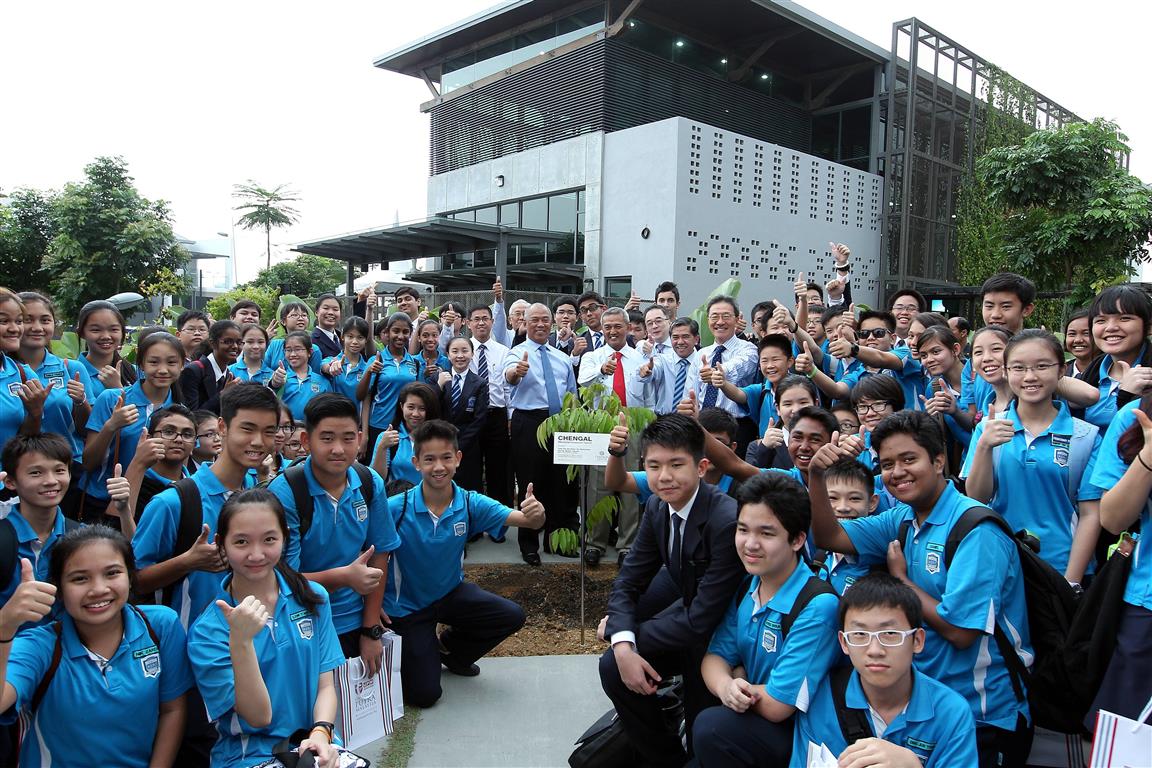
YAB Tan Sri Dato’ Hj Muhyiddin bin Hj Mohd Yassin, Deputy Prime Minister of Malaysia, with Sri KDU® students at the launch of Chengal House by Paramount Property.
Cyberjaya, 21 October 2014: YAB Tan Sri Dato’ Hj Muhyiddin bin Hj Mohd Yassin, Deputy Prime Minister of Malaysia, today officiated the launch of Chengal House, the first commercial property development of its kind in Malaysia to be built using reclaimed chengal timber. This project by Paramount Corporation Berhad (PCB) is in collaboration with partners, Universiti Putra Malaysia (UPM) and the Malaysian Timber Industry Board (MTIB).
During the event, YAB Tan Sri Dato’ Hj Muhyiddin bin Hj Mohd Yassin witnessed the signing of a Memorandum of Understanding (MoU) between Paramount Corporation with UPM and MTIB. This move formalised the tripartite partnership, which will promote the use of Malaysian wood in different ways – PCB in property and private education; UPM in the area of education and forestry while MTIB provides expertise in the promotion of timber products.
Chengal House by Paramount Property is an 11,000-square-feet clubhouse located at Sejati Residences in Cyberjaya, constructed using 200-year-old reclaimed chengal timber as a key element.
“At Paramount, the ethos of respecting people and planet has always been something we hold close to our heart. It drives the way we design and plan our properties, and it is very much at the core of our education system. We were very honoured when Universiti Putra Malaysia and the Malaysian Timber Industry Board shared our pride in Chengal House – and expressed their willingness to partner with us in a series of programmes to tell Malaysians, especially young Malaysians, as well as the world, about Chengal House,” said Jeffrey Chew, Group Chief Executive Officer for PCB.
“This tripartite partnership isn’t just about a building. Chengal House will be a catalyst that will change the way Malaysians think about forests, timber and wood preservation. Simply by putting reclaimed wood from an old factory to good use, opportunities have opened up far beyond what we imagined. Moving forward, together with UPM and MTIB, we will continue to identify various joint initiatives to create more community development platforms around Chengal House and iconic projects such as this,” he added.
He surmised, “In doing so, we hope to make a small but meaningful contribution towards the continued growth and progress of Malaysia.”
The partnership is divided into two broad areas: Property and Education. In property, the partners will explore the use and application of timber in construction – not just in design and detailing, but also as a structural material. The durability of our Malaysian hardwoods offers this opportunity, which few countries can match. In education, UPM and MTIB will be working with Paramount’s education arm, Sri KDU® Schools, to extend their Eco Schools programme to include the study of forests, trees and plants.
“Our students will take part in field trips to Chengal House to study how it has been designed, and to also study the arboretum around it, which has been put in place with input from UPM. As part of this experiential education programme, students will participate in field trips to the UPM Forest Reserve in Puchong and MTIB’s timber application facilities in Bangi, to better understand the role wood can play in improving our lives.
“It is our hope that, over time, these students will grow up to be Malaysians who are not just proud of the breadth and diversity of our forest resources, but who have a deep and abiding understanding and appreciation of their many uses in our lives,” explained Chew.
MTIB will also be showcasing Chengal House to the world, as part of their efforts to tell the world of the versatility of Malaysia’s wood resources and their superior strength which makes them suitable for heavy and medium applications as well as decorative purposes, such as furniture, moulding and carved items.
Chengal House is located within Sejati Residences, a low density, high-end gated and guarded development at Cyberjaya with only 249 landed homes spread across 40 acres. With a concept of “inviting the outdoors in”, it is designed and built with environmentally friendly and sustainable concepts. Only 20 minutes from KL, it is well-connected with a good network of highways.
The Chengal House Story The Chengal House story began when Paramount purchased an old shoe factory in Selangor, which they then discovered was extensively constructed from Malaysian hardwoods – mainly chengal and balau, with some merbau and kempas. Chengal is a number one hardwood, or a heavy hardwood, after belian and is highly valued for its quality, durability and density.
In an effort to ascertain its age, a piece of the reclaimed chengal wood was sent to an expert from the Faculty of Forestry in Universiti Putra Malaysia, Associate Professor Dr H’ng Paik San. What ensued after an extensive carbon-dating process in the US was the surprising revelation that the age of this wood was approximately 200 years old. This makes it one of the oldest chengal wood finds in Malaysia today.
Recognising its worth, Paramount Property, the property arm of PCB, came up with the idea to use the reclaimed chengal wood as a core element of design in the construction of the Sejati Residences clubhouse, which was then aptly named Chengal House.
Architects for Sejati Residences were commissioned to design a clubhouse that is green, incorporating the reclaimed timber to complement the Sejati Residences’ concept of “inviting the outdoors in”. As such, Chengal House is designed to incorporate double-volume ceilings and natural ventilation. Chengal’s superior strength and durability makes it a reliable building material for structural applications such as columns, beams and roof trusses.
Much care was taken when removing the wood from the old factory as well as during fabrication. As a durable material, the reclaimed chengal required minimal treatment in cleaning and filling to preserve its natural texture and beauty of the solid grain profile. For added strength, each column was constructed from four pieces of wood with a steel bar sandwiched in the middle. This successful combination of old and new showcases the rustic beauty of the timber at the same time.
With reclaimed chengal as a unifying element, the result embraces the environment with an ecologically sustainable design within Paramount Property’s first ever development in the premium category of the market. The construction of Chengal House is a step in the right direction for Paramount even as it moves towards more ecologically sustainable designs in the future.





